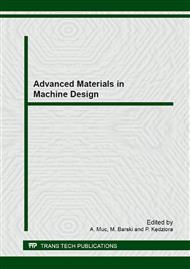p.43
p.59
p.75
p.81
p.97
p.105
p.119
p.131
p.143
Hydro-Pneumatic Accumulator Study with the Use of Thermodynamic Model Simulation
Abstract:
The presented paper deals the simulation model of hydro-pneumatic accumulator. Mathematical model of the system uses the motion and flow continuity equations as well as formulas determining hydro-pneumatic piston accumulator behavior. In accumulator model heat transfer phenomena are included and Van der Waals real gas low, to calculate gas parameters during its operation. Modeling and simulation tests are performed for different work cycles to determine the key parameters of hydrostatic system associated with energy saving, such as: piston velocity, working pressure and heat flux. The aim of the research program is to determine the efficiency of energy accumulation in the assumed work cycles and to find which parameters are significant and how they can be changed to increase accumulator efficiency.
Info:
Periodical:
Pages:
97-104
DOI:
Citation:
Online since:
February 2013
Authors:
Keywords:
Price:
Сopyright:
© 2013 Trans Tech Publications Ltd. All Rights Reserved
Share:
Citation:


